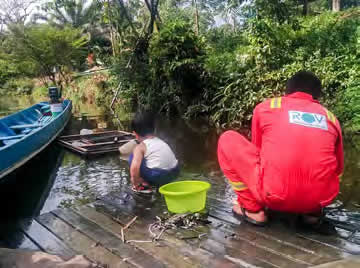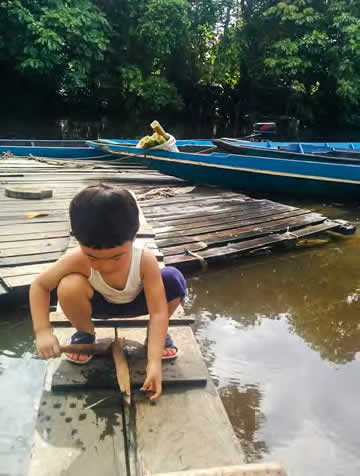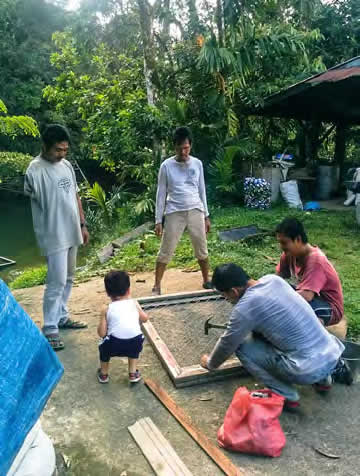The dichotomy between engaging in fieldwork and raising children has often resulted in the former being viewed as an individual, solitary life. When a fieldworker becomes a parent, he/she has two choices: either take children on fieldwork assignments or leave them behind. I’m not here to judge which is the right decision as it is a decision that needs to be taken by each parent individually. Here, I describe my own fieldwork experience with my son, a fouryear-old at the time.
For my doctoral dissertation, I lived and worked in a village in the tropical rainforest of Borneo. I continued working until the seventh month of my pregnancy. During my fieldwork, most of the villagers were excited at the prospect of my baby and enjoyed guessing its sex using porcupine meat and discussing its “local” name. In fact, my pregnancy was a constant subject of conversation amongst the villagers. One day, a divination informed us that my baby would be a boy, which was accurate! My adoptive father in the village soon gave the unborn baby the name Epoi. Giving a “local” name to an individual signifies being welcomed into the family there; I also have a “local” name, Surai. As my pregnancy progressed normally and my unborn baby had already been accepted as a member of the family and the village, after I gave birth, I planned to take my son with me into the field without any hesitation or anxiety.
My fieldwork assignment in Sarawak, Malaysian Borneo, where my son accompanied me, lasted 17 days. Our trip began and ended in Kuching, the capital city of the state of Sarawak; for the remaining 10 days of our visit, we spent valuable time in the rainforest village.
Interestingly, I noticed a striking difference between my son’s behavior in the city and in the village. We arrived in Kuching in the middle of the celebrations for the Chinese New Year and at the height of the rainy season, which made for long, barely tolerable days in the city (Fig. 1). Although we stayed in a hotel, we had to leave our cozy room for meals at the outside cafés, where there were no comfortable chairs and no kids’ menus. Furthermore, the people around us had unfamiliar appearances and were chatting in a strange language, which was difficult for my son. In addition, it was raining heavily; the paved, but rough roads and footpaths had turned slippery, and it was difficult to walk. At times, the weather made it impossible for us to go out, leaving us without food and therefore hungry. Although my son pretended to be okay and tried to stay in the room, he always cried in the middle of the night from hunger pangs. I had to keep bananas and other fruits or some biscuits in our room for him.

Fig.1 The Sarawak River after heavy rain in Kuching
Bringing children into foreign situations can be stressful for both children and parents. However, although he found the dark city life difficult, my son fortunately acclimatized to village life quickly and happily. The village was no different from the city for him because even the villagers had strange appearances and spoke a foreign language. However, the villagers’ special interest in my son made all the difference because for them, he was a villager with the village name Epoi. The return of Epoi was nothing to casual for them, particularly for my adoptive family. My adoptive father’s elder brother took time off work and rushed over to see Epoi with his hands filled with sweets. The welcome my son received demonstrated his place in the village.

Fig.2 Epoi and my adoptive father’s brother
The teenage girls and boys in the village, who had shared village gossip with me and explained village manners, had undergone a ceremonious coming of age in the forest during the period of my dissertation fieldwork and had now become fully grown adults. They now enjoyed playing in the river with Epoi, picking low-hanging fruits to give to him, and playing around with him to make him smile and laugh. Another of my adoptive father’s brothers showed him the right way of throttling a chicken at the riverside boat jetty (Figs. 2 and 3). My adoptive mother’s brother provided special seating that gave us a good view of the new wooden boat they had built by themselves. In addition, many women loved to feed us the gluttonous rice from Japan with snacks and fruits. In particular, my adoptive aunt was the first person to find out that Epoi very much loved longan, one of the popular tropical fruits in Borneo. She gathered this and other fruits for us from her own garden almost every day.

Fig.3 Epoi duplicates his action.

Fig.4 My adoptive father had been working on repairing a fence with his friends and Epoi.
I was surprised that not only had the boy who was always so close to tears in Kuching become so much better that he looked like a different person in the village, but also that he had an incredible ability to adapt. When we had just arrived in the village, my adoptive father had been working on repairing a fence with his friends. Spotting my son, he stopped and spoke to him: “Welcome, Epoi! Anyway, hand that stone to me.” Remember, it was the first time they had met each other and, of course, my adoptive father spoke in his local language. But, lo and behold, Epoi picked up the stone and passed it to him, joining in naturally (Fig. 4). He was no longer the crybaby from Kuching but a miniature adult. In addition, he learned a few words and phrases in the unique language spoken in the village, such as
ləʔoŋ (a general term for the fruit of a tree)
laʔɔh (hungry)
kuman (eat)
turau (sit)
tʃi:+turo (go to sleep)
He also learned to count numbers from 1 to 10 in the language. Now, I may be a doting mother to my son, but I am sure that had he remained in the village for an extended period of time, he would have naturally been a better speaker of the language than me, and I believe he would have become much tougher.
On my return, as the first step of my fieldwork, I visited a number of houses and caught up with an old friend in the village. Some people had passed away, and a new pastor had taken the place of the old one. Most of the students who had been at the village primary school when I had stayed here previously moved on to the secondary school farther away from the village.
People welcomed us warmly wherever we went, and my son felt free to be himself everywhere. More fortunately, in spite of eating the local food and drinking water from the river, Epoi never got diarrhea or ran a high fever.
Thus, my first challenge of staying in the rainforest village with my son ended safely and peacefully. In fact, the only trouble was itchy skin caused by insect bites. However, in spite of our uneventful time in the village, it was unexpected for me to realize that Epoi would have an immense fear of the crowded city of Kuching, even considering the torrential rainfall that hit the city during our stay. After this experience, although I believe I have learned some lessons, I know that different “unexpected” troubles and/or difficulties will lie ahead the next time. But this is true that fieldwork tends to change as we get older and move onto the next stage of life, whether we choose to bring our children along or not.
